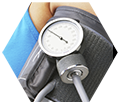
Low Blood Pressure

The American Heart Association provides this information in regards to low blood pressure. For more information please consult your doctor.
If my blood pressure stays around 85/55, do I have a health problem?
As long as you are not experiencing symptoms of low blood pressure, there is no need for concern. Most doctors consider chronically low blood pressure dangerous only if it causes noticeable signs and symptoms, such as:
- Dizziness or lightheadedness
- Fainting (called syncope)
- Dehydration and unusual thirst Dehydration can sometimes cause blood pressure to drop. However, dehydration does not automatically signal low blood pressure. Fever, vomiting, severe diarrhea, overuse of diuretics, and strenuous exercise can all lead to dehydration, a potentially serious condition in which your body loses more water than you take in. Even mild dehydration (a loss of as little as 1 percent to 2 percent of body weight), can cause weakness, dizziness, and fatigue.
- Lack of concentration
- Blurred vision
- Nausea
- Cold, clammy, pale skin
- Rapid, shallow breathing
- Fatigue
- Depression
As long as no symptoms are present, low blood pressure is not a problem. However, if your blood pressure is normally higher or if you are experiencing any of the symptoms listed above, your low pressure may have an underlying cause.
Low blood pressure can occur with:
- Prolonged bed rest
- Pregnancy
- During the first 24 weeks of pregnancy, it's common for blood pressure to drop.
- Decreases in blood volume
- A decrease in blood volume can cause blood pressure to drop. A significant loss of blood from major trauma, dehydration, or severe internal bleeding reduces blood volume, leading to a severe drop in blood pressure.
- Certain medications
- A number of drugs can cause low blood pressure, including diuretics and other drugs that treat hypertension; heart medications such as beta blockers; drugs for Parkinson's disease; tricyclic antidepressants; erectile dysfunction drugs, particularly in combination with nitroglycerine; narcotics and alcohol. Other prescription and over-the-counter drugs may cause low blood pressure when taken in combination with HBP medications.
- Heart problems
- Among the heart conditions that can lead to low blood pressure are an abnormally low heart rate (bradycardia), problems with heart valves, heart attack, and heart failure. Your heart may not be able to circulate enough blood to meet your body's needs.
- Endocrine problems
- Such problems include complications with hormone-producing glands in the body's endocrine systems; specifically, an under-active thyroid (hypothyroidism), parathyroid disease, adrenal insufficiency (Addison's disease), low blood sugar and, in some cases, diabetes.
- Severe infection (septic shock)
- Septic shock can occur when bacteria leave the original site of an infection (most often in the lungs, abdomen or urinary tract) and enter the bloodstream. The bacteria then produce toxins that affect blood vessels, leading to a profound and life-threatening decline in blood pressure.
- Allergic reaction (anaphylaxis)
- Anaphylactic shock is a sometimes-fatal allergic reaction that can occur in people who are highly sensitive to drugs such as penicillin, to certain foods such as peanuts, or to bee or wasp stings. This type of shock is characterized by breathing problems, hives, itching, a swollen throat, and a sudden, dramatic fall in blood pressure.
- Neutrally mediated hypotension
- Unlike orthostatic hypotension, this disorder causes blood pressure to drop after standing for long periods, leading to symptoms such as dizziness, nausea, and fainting. This condition primarily affects young people and occurs because of a miscommunication between the heart and the brain.
- Nutritional deficiencies
- A lack of the essential vitamins B-12 and folic acid can cause anemia, which in turn can lead to low blood pressure.
